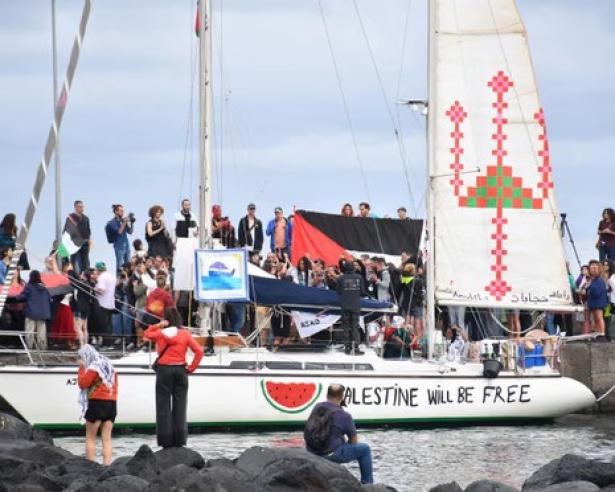While World Leaders Dither Over a Gaza Peace Plan, I’m Hoping To Break Israel’s Blockade
My first task on the boat is to ease a red rope from the cockpit while a Danish participant opposite me tautens a white one. Between us, we hoist the sail. The coastline of Augusta, Sicily, fades behind us. There are seven people on board: three French, two Irish, one Dane and one Irish-Danish for good measure.
Ours is the fastest boat of the Thousand Madleens flotilla sailing to Gaza just behind the Global Sumud ships. My boat was the last to depart; we saw off eight other ships at the port, having just shared a week of intensive training with those on board. All participants have been sleeping on our boats since we arrived, so we know their layouts well. I have found a space for each of my possessions to “live” in a cramped environment where everything must be kept in lockers.
If successful, we will deliver aid for Palestinians in Gaza. The boat is loaded with medicine, baby formula, prosthetic limbs for the many amputees that Israeli bullets have created. For the several weeks ahead of us, the organisers told us to bring a personal rucksack no larger than an aircraft carry-on bag. Every available crevice of the boat has been crammed with emergency supplies for Palestinians.
Initially, our boat was named Algol – a “demon star”, apparently. We rechristened it Milad after Milad Walid Daqqa, the daughter of a long-term imprisoned Palestinian politician and writer. Just before we set sail, I painted the new name in green on the side of the boat from a dinghy.
Our sailors have a reassuringly firm sense of how everything should be run. They sailed the Milad across the Atlantic themselves before recommending the flotilla organisers buy it for the journey to Gaza. It shows plenty of wear – indelible stains on the kitchen counter, temperamental lights and sockets – but in terms of seaworthiness, it has amply proven its chops.
I have done everything I can to ward off sea sickness: wristbands, under-ear patches and pills to be taken twice daily. Otherwise, it’s best to stay outside and look at the horizon. My new open-air writing study consists of a 30cm-deep patch of sitting space near the starboard; the only barrier between me and the water a metre in front is two thin lines of metal rope. Everything is grey-blue today – the water, the sky. I didn’t bring a laptop – too impractical to use on the deck – so I write in a notepad and on my phone.
Israel has intercepted or attacked every flotilla to Gaza since 2010, always in international waters – the flotilla routes never enter Israel. The Sumud boats ahead of us have already faced two rounds of drone strikes, one while docked in Tunisia and another in Greek waters. Israel has not commented on the attacks. Flotilla participants are not the true target of these aggressions: they stem from Israel’s relentless campaign to block the means of life from Palestinians. If we were delivering aid to anyone else, we would be left alone. Although attacks on the flotilla are illegal and highly dangerous, everyone on my boat is more concerned about the far worse atrocities Israel routinely commits in Palestine and particularly in Gaza.
It can feel hopelessly insignificant to fold towels and untangle deck cables while Israel ethnically cleanses and obliterates an entire people. But I think of it this way: the urgency in Gaza is precisely why our mission needs to be well run, down to every last detail. Our desire isn’t merely to do something, anything; it’s for it to be effective.

Activists wave palestinian flags as a flotilla leaves the harbour. Photograph: Pascal Pochard-Casabianca/AFP/Getty Images
The US and UK are hardly more credible as state actors, having sown chaos in the region for many decades. Yet Donald Trump and Tony Blair are key voices in the new proposed peace plan that has left Palestinians sceptical. Watching this development from the flotilla are ordinary Americans and Brits. They sail with the rest of us as conscientious objectors to their countries’ many misdeeds.
We’re still in Italian waters now; we’ve been told the voyage to Gaza will take two to three weeks, depending on weather and on how events unfold. It’s only rational to be prepared for scenarios besides the ideal one of safely delivering our aid in Gaza. But in highlighting the lengths Israel goes to in order to starve Palestinians, and in pressurising our governments back home, we hope to accomplish something regardless.
===
Naoise Dolan is an Irish writer and the author of Exciting Times and The Happy Couple


Spread the word